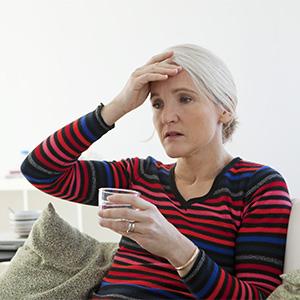
And other questions on menopause answered by Dr. Usha Saraiya, Consultant Obstetrician – Gynaecologist at Breach Candy, Cumballa Hill Hospital & Saifee Hospital. She reiterates - Preventive actions helps to prevent Osteoporosis, diabetes & heart disease.
1. What is the average age of menopause in India?
It is between 45 years to 50 years. In India it is said to be earlier say from 42 years to 47 years. But women who are not educated do not tell their age correctly. So it may not be very reliable.
2. What are the common complaints/symptoms that you see in your menopausal patients.
Common complaints are mood swings. They cannot control their emotions well. They cry easily & get very angry without much provocation. They realise it themselves & regret it afterwards. Many also are disturbed by hot flashes. Some notice that there is a lack of libido & are no longer interested in sex life. Urinary frequency & repeated attacks of urinary tract infection are also a sign of early menopause.
3. How do you usually deal with their complaints/ symptoms.
Most sympathetically, reassure them that it is a passing phase & that they have to learn to cope with it. Symptomatic treatment has to be given.
4. At what stage should they seek your medical attention with these symptoms?
As early as possible. Benefits are more when treated at an early stage.
5. Do you recommend any particular diet for them?
Not a particular diet but we do take a history of the diet & recommend some changes
6. Do you enrol the help of a dietician/nutritionist?
Sometimes, especially in overweight women.
7. How about any specific exercises or forms of workout?
Regular exercise is always suggested. Going for a walk is something anyone can do.
8. Are relaxation techniques such as yoga or meditation recommended?
Yoga and meditation help a lot in an over anxious patient.
9. How many patients experience psychological symptoms or depression?
About 5% of women admit to being depressed or have psychological problems. During the consultation you can get an idea of these patterns.
10. Which patients are potential candidates for HRT?
Potential candidates are those of surgical menopause. When ovaries are removed surgically there is a sudden loss of hormones & temporary replacement therapy is required. It is also considered when symptoms are severe & psychological changes are obvious.
11. What are the common side-effects of HRT and how do you deal with them?
HRT has to be given under continuous medical supervision & after doing all the tests. It is a lot of responsibility for the gynaecologists. Patients have to cooperate & come for regular checkups.
12. Do you suggest Psychiatry help for women who experience depression on HRT?
Yes. HRT cannot cure depression. We work with the Psychiatrist.
13. What medications are they usually prescribed?
In addition to HRT, antipsychotic & anti depressant medicines are prescribed. Once again close follow up is mandatory.
14. Any new medicines in the market for menopause, hormonal or otherwise?
Estradiol Valearate is the new estrogen molecule found to be suitable for menopause. Isoflavones have always been advised as they are plant estrogens & are safe. Nowadays they are recommended for prolonged period. Estrogen patches are safer because they bypass the liver. Any subcutaneous route if available may be recommended.
15. Would you prescribe them?
Yes, after seeing the trials & the reports of trials from Indian patients.
16. What is the best advice to women who are perimenopausal? If and what lifestyle changes would you recommend?
Pre & Perimenopausal is the best time for preventive measures. A thorough check up at around 40 years of age is recommended. Preventive actions helps to prevent Osteoporosis, diabetes & heart disease. Lifestyle changes if made at this stage will ensure a long life & healthy life. Preventive strategies have to be instituted before the disease damages the organs. The old proverb “A stitch in time saves nine” is very appropriate here.

Dr. Usha B. Saraiya, MD DGO FIAC FICS FICOG FRCOG (UK), is a Consultant Obstetrician – Gynaecologist at Breach Candy, Cumballa Hill Hospital & Saifee Hospital, Vice President – Central Asia Medical Women’s International Association, Chairman, Indian College of Obstetrician & Gynaecologist (2006-2009)
















